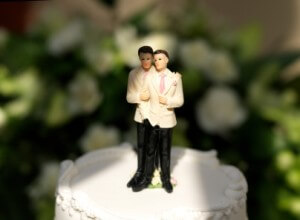Same-Sex Marriage: Does the Supreme Court Get the Final Say?
September 30th, 2016

As major proponents of gay marriage, the Universal Life Church commends David Cameron for standing up against his own party’s principles.
During the summer of 2015, the U.S. Supreme Court finally appeared to settle the question of whether or not same-sex marriage is a legal right. In Obergefell v. Hodges, the court decided in a 5-4 ruling, that the Constitution of the United States not only allows, but guarantees the right to same-sex marriage. The court relied on the 14th Amendment in requiring a state to issue marriage licenses to same-sex couples and to further recognize out-of-state marriages if the out-of-state marriage was lawfully performed.
Flash forward a little more than 12 months and we can assume that all of the states have embraced this court ruling, right? Think again. Many states have responded by adopting versions of the “Religious Freedom Restoration Act” or RFRA. RFRA is a federal law enacted in 1993, which states in part that the federal government may only regulate your religious liberty by the least restrictive means possible. As a result of the Supreme Court’s holding in City of Boerne v. Flores, RFRA could only apply to federal entities. Accordingly, many states that had not already adopted RFRA laws began enacting their own RFRAs. Post Obergefell v. Hodges, 16 states adopted RFRA. Currently, 21 states have their own versions of RFRAs as adopted through legislation and another 10 states have RFRA-type law handed down through the courts.
Religious Freedom Restoration Acts are Increasingly Used as Tools for Discrimination
Historically, there has been confusion over RFRA laws and whether they are intended to promote religious freedom or whether they are tools to be used in anti-LGBT sentiment. On the one hand, RFRAs promote personal liberties but on the other hand, they can be used as a foundation to enact bills like Mississippi’s recent H.B. 1523.
In a recent blog post, we discussed a bill posed to take effect on July 1, 2016 that would allow business owners to deny service to the LGBT community. In addition, the “Protecting Freedom of Conscience from Government Discrimination Act” provided that judges and clerks who have deep religious aversion to the LGBT community can refuse to perform wedding ceremonies and that another state employee who did not maintain such beliefs would step in and do the job. On June 30th, a day before the law was to take effect, U.S. District Judge Carlton Reeves enjoined H.B. 1523, effectively doing away with it at least for now. Unfortunately, it may be difficult for Judges like Reeves to keep up with the onslaught of discriminatory legislation. Fortunately, we do still see the democratic process at work and many of these bills die before becoming law. Oklahoma provided one such example of using RFRA-like legislation for discriminatory purposes. If SB 440 had been passed, it would have expanded the definition of “religious entity” to include private business.
The list of this type of legislation goes on and is growing daily. For update, visit us frequently here at Universal Life Church. We put great effort into keeping abreast of all issues affecting religious freedoms in our country.


